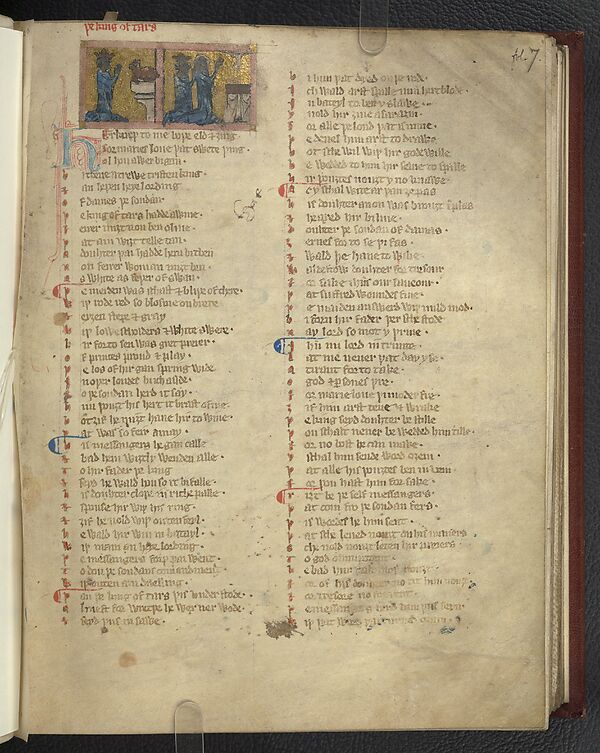Religious texts.
Found in 45 Collections and/or Records:
12th-century manuscript of 'De Trinitate' of St Augustine.
13th-century manuscript containing extracts from the writings of Gilbert of Hoyland, St Bernard, St Gregory, St Augustine, and other theological works.
15th-century manuscript containing the 'Oratio in die cinerum apud Pium Papam Secundum' of Giovanni Antonio Campano, and the 'De ira Dei', 'De opificio Dei', and 'De fenice ave' of Lactantius.
15th-century manuscript of the 'Mirror of the Blessed Life of Jesus Christ', a translation by Nicholas Love of the Pseudo-Bonaventure 'Meditationes Vitae Christi'.
15th-century manuscript of the 'Moralia in Job' of Pope Gregory I.
‘1467 MS’ written by Dubhghall Albanach mac mhic Cathail and the Reverend John Beaton’s ‘Broad Book’, written by Ádhamh Ó Cuirnín.

'Auchinleck manuscript', one of the earliest and largest compilations of Middle English verse, including romances and religious and historical pieces
Calligraphically written scripture extracts of Thomas Philip Graham of Airth., 1858.
Composite volume, of uncertain origin, containing two manuscripts of works by St Bonaventure, the 'Breviloquium' and the 'Formula noviciorum'.
Dialogue containing the basic articles of Christianity, translated into Gaelic by Alexander MacAulay (autograph).
‘Discursos preliminaries que antecedent a todas las contro versias en puntos de Religion’ by AG Silveira, libro ante primero., 1st half of 18th century.
Fifteenth century copy of the Summa Casuum of Bartholomaeus de Sancto Concordio (or Pisanus), an alphabetical handbook of canon law., 15th century.
The preface begins 'Quoniam, ut ait Gregorius super Ezechiel, nullum omnipotenti Deo'; the text 'Abbas in suo monasterio'.
The text is written in different hands. In double columns. Initials in red and blue; a few marginal flourishes.
Illuminated manuscript of `De civitate Dei` [The City of God] by St Augustine.
Late 13th-century manuscript of the 'Compendium theologicae veritatis', attributed to Robert Grosseteste but probably by Hugh Ripelin of Strasbourg.
‘Libro de Libros’ and other theological dialogues, partly in verse, by A G Silveira.
‘Libro de Libros, donde se detesta todo lo contrario se cree y admite todo lo conforme al sacro Libro… Dialogos theologicos. Ynterlocutores, un sabio ministro reformado presidente; un doctor catholico Apostolico Romano; Un Turco Mahometano erudito; un Judio desapasionado. Por A.G.S. Silveyradas’.
The first five volumes consist of dialogues between the same personages ‘todo en versos jocoserios, para deleitar aprovechando’. The rest is in prose.
‘Libro de Libros’ by A G Silveira, libro quinto., 1st half of 18th century.
‘Libro de Libros’ by A G Silveira, quarta parte., 1731.
‘Libro de Libros’ by A G Silveira, tomo primero., 1st half of 18th century.
‘Libro de Libros’ by A G Silveira, tomo segundo., 1734.
‘Libro de Libros’ by A G Silveira, tomo terzero., 1st half of 18th century.
‘Libro de Libros’ by A G Silveira, [volume seven]., 1st half of 18th century.
‘Libro Mudo’ by A G Silveira., 1st half of 18th century.
Manuscript containing death tales and other tales, with some religious texts.
Manuscript in Gaelic containing short religious, historical and mythological texts.
Manuscript of a religious work entitled 'Of Charity'., [Circa 1700.]
The religious work is in 24 lessons; lessons 13-22 are on the Decalogue. At the end of the volume there are: 'Ce livre est écrit par un Papiste' (page 540); 'P. L. Du Pont' (folio ii verso). The manuscript may be a translation of part of a work by the Spanish Jesuit, Friar Luis de la Puente.
